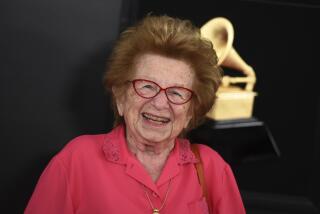Six women, including Go-Go’s Jane Wiedlin, accuse famed L.A. DJ of sexual assault

- Share via
This story contains details of sexual assault.
Six women have now accused famed L.A. DJ Rodney Bingenheimer of sexually assaulting them when they were minors, according to court documents and media reports.
Among the accusers is Jane Wiedlin, who co-founded the new wave group the Go-Go’s in 1978. When she was 15, Wiedlin says, she frequently sneaked out of her parents’ home to visit a West Hollywood nightclub notorious for being a hot spot for underage girls and rock star patrons: Bingenheimer’s English Disco.
It was on one of these nights, around 1974, that Wiedlin alleges Bingenheimer sexually assaulted her in a back room.
Representatives for Bingenheimer and SiriusXM, on which he hosts a weekly show, did not immediately respond to The Times’ request for comment on the allegations. Wiedlin’s account was detailed in a Rolling Stone article published Monday.
“I remember [the room] being very dark and cold,” Wiedlin told the publication. “I was a virgin. I didn’t have much experience with boys; boys tended to ignore me ... He picked me out that night. I didn’t know what was going to happen before, but he started rubbing against me with his crotch against my crotch. I didn’t know what to do; I was pretty much frozen. I didn’t say anything; I didn’t try to stop him.”
Wiedlin alleged Bingenheimer, then around 27 years old, instructed her to remove her belt because it was “getting in the way.” He continued to rub his crotch against her, Wiedlin said, and then he ejaculated on her clothing.
Wiedlin previously detailed such an encounter in a chapter of “Under the Big Black Sun,” X vocalist John Doe’s book on L.A. punk history, but did not name Bingenheimer.
Runaways songwriter Kari Krome is suing the estate of Kim Fowley for sexual assault. She also accuses DJ and nightclub owner Rodney Bingenheimer of sexually assaulting her when she was 13.
“I wasn’t entirely sure what had gone down until we went back out. He disappeared [into the crowd], I went back to my friends, and my satin pants were a big mess,” she told the outlet. “It was weird; it never occurred to me that that had been a crime. I didn’t know what to think. It wasn’t until the #MeToo movement started when I realized I was sexually assaulted by [an adult] when I was 15.
“I was this sweet, sensitive, artistic little girl, and I really wanted to be an adult,” she continued. “I was intrigued by the sexuality of [David] Bowie and these other people. And I wanted it, but I was also scared and I didn’t want it, and I didn’t know how it was going to happen. And I certainly didn’t think this kind of creepy little man was something I would’ve chosen.”
Four other women told Rolling Stone they had similar encounters with Bingenheimer. All of them alleged they were minors at the time.
The allegations follow a lawsuit filed in April by Kari Krome, songwriter and co-founder of the rock band the Runaways. In the lawsuit, filed against Bingenheimer and the estate of the band’s late manager Kim Fowley, Krome alleged that the men sexually assaulted her in the 1970s, starting when she was 13.
Documentary on the ’80s band “The Go-Go’s.”
In court documents obtained by The Times, Krome — whose legal name is Carrie Mitchell — alleges that when she was “approximately 13 and 14 and 15 years old, Defendant Rodney Bingenheimer and Defendant Kim Fowley used their roles, status and power as adults, as well as their connections to and work in the music industry to gain access to manipulate, exploit and sexually assault” her.
According to the lawsuit, the sexual abuse began after Krome met Bingenheimer, then 28, at his Sunset Strip nightclub. She claimed that he began grooming her and eventually began sexually assaulting her. Krome alleges that Bingenheimer knew that she was interested in music and introduced her to his “good friend” Fowley, who eventually hired her as a songwriter for his publishing company.
Fowley died in 2015.
Steven Tyler is facing sexual assault allegations from a second woman, who says the rock singer forcibly groped and kissed her in the ‘70s, when she was 17.
After the #MeToo movement took off, Wiedlin reconsidered what had happened and confided in her bandmates and one of her old friends who sneaked out to Bingenheimer’s club with her all those years ago. Her friend, who didn’t want her name included in the Rolling Stone article, told Wiedlin that Bingenheimer had allegedly sexually assaulted her, as well as another friend.
“I was f— shocked that I didn’t know,” Wiedlin told the outlet.
Once Krome came forward with her suit, Wiedlin said she felt ready to speak out publicly as well.
Throughout his career, Bingenheimer was widely considered one of the most influential DJs in the country, hosting “Rodney on the Roq” on Los Angeles’ KROQ from 1976 to 2017. For the last six years, he has hosted a weekly show on SiriusXM’s Underground Garage channel. In 2007, he was honored with a star on the Hollywood Walk of Fame.
“He got laid by an Elvis fan if he’s with Elvis. He can get laid by a Beatle fan if he’s with a Beatle,” Fowley said of Bingenheimer in the documentary, “Mayor of the Sunset Strip.” “So whoever your sexual icon is — Rodney is with them — so if you want to make love to Elvis, you better make love to Rodney. That’s the closest you’ll ever get.”
KROQ’s Rodney Bingenheimer reviews his Sunset Strip reign on film.
In the documentary, actor-singer Michael Des Barres described Bingenheimer as the middle man between attractive young girls and men.
“It’s almost like a drug dealer, except Rodney was dealing girls,” he said. “Not in the sense of a pimp or anything, but the power that a dealer has; how everybody is your friend because you’re holding the coke. It was the same with Rodney. He just had access to these beautiful, beautiful little nubile girls with stars in their faces. Coupled with his enthusiasm for the acts’ genuine musical ability, and style and glamour, he also had this extraordinary posse.”
Times contributor Steve Hochman interviewed Bingenheimer ahead of the documentary’s premiere in 2003, and asked how the DJ had so successfully integrated himself into the music scene.
“Be kind. Don’t be pushy,” Bingenheimer responded. “Like what they like. And, just be kind.”
More to Read
The biggest entertainment stories
Get our big stories about Hollywood, film, television, music, arts, culture and more right in your inbox as soon as they publish.
You may occasionally receive promotional content from the Los Angeles Times.













